- Home
- Micheal Maxwell
[Cole Sage 03.0] Helix of Cole
[Cole Sage 03.0] Helix of Cole Read online
CONTENTS
Title Page
Free Book Offer
Other Cole Sage Mysteries
Please Consider This
Chapter 1
Chapter 2
Chapter 3
Chapter 4
Chapter 5
Chapter 6
Chapter 7
Chapter 8
Chapter 9
Chapter 10
Chapter 11
Chapter 12
Chapter 13
Chapter 14
Please Consider This
Excerpt from Cole Sage Book #4 Cole Dust
About the Author
Free Book Offer
Also by Micheal Maxwell
Copyright Page
To receive your free copy of Death of Choice, click here.
OTHER COLE SAGE MYSTERIES
Diamonds and Cole (Cole Sage Mystery #1)
Cellar Full of Cole (Cole Sage Mystery #2)
Helix of Cole (Cole Sage Mystery #3)
Cole Dust (Cole Sage Mystery #4)
Cole Shoot (Cole Sage Mystery #5)
Cole Fire (Cole Sage Mystery #6)
Heart of Cole (Cole Sage Mystery #7)
Cole Mine (Cole Sage Mystery #8)
PLEASE CONSIDER THIS
If you have enjoyed Helix of Cole, please take a moment now and leave a review on Amazon. Readers like you are the best advertisement in the world!
CHAPTER 1
Cole was sunk down in his overstuffed leather chair, feet up on the ottoman and a half-gallon carton of Breyer’s Brownie Mud Pie ice cream in his lap. It was time for his annual viewing of Woodstock. With an eight-foot screen, 5.1 Surround Sound, and 500 watts of power putting him in the center of the Festival, he was missing only the rain, mud, and marijuana to make it just like the real thing. Cole was finally at home in his new house. He found a kid at the Chronicle who was an electronics whiz and, with his help, Cole’s home theater system was fine-tuned—looking and sounding 10 times better than it ever did in Chicago.
It was more than a year since he moved to San Francisco. He never realized how much he hated the cold Chicago weather until he spent a winter in the City by the Bay. It was a smart move. The Sentinel had gone through too many changes after Mick Brennan died. A couple people kept him up to date by e-mail, but as the months passed, the e-mails became few and far between. Now he seldom heard from the “Chicago Mob.” The only one to stay in touch was Olajean. She e-mailed a couple times a week and even sent care packages of her oatmeal raisin cookies and a quart jar of barbeque sauce just in case, as she put it, “California barbeque isn’t up to our standards.”
Olajean was about the only person he really missed in Chicago. There was Tom Harris, too, but theirs was a different kind of relationship. During Cole’s lowest times, Tom was always there with a “stop feeling sorry for yourself” or a swift kick to put Cole right. Cole called Harris several times in the past year, twice just to get the legal angle on a story he was working on, the rest of the time just to say “hello.” Tom’s wife sent Cole a gift certificate for movie rentals at Christmas and a nice card on his birthday.
Cole’s house was in the Marina District and was costing a small fortune. Chris Ramos, the life-partner of Cole’s new boss, made good on his promise to find just the right place for him. The neighborhood was beautiful and pure San Francisco. From his front window, he could see San Francisco Bay and the Golden Gate Bridge. All the furniture Cole moved from Chicago fit perfectly in the new place, and Chris was rather put out that his services as an interior decorator were not needed. Cole took Chris and Chuck to a Moroccan restaurant for dinner, and that seemed to smooth things over.
To his amazement, Cole bought a bicycle and began to riding around Crissy Field. He loved to see the sailboats on the bay and often stopped to watch people fly their kites. Last May, he got so enthused at the Festival of the Winds that he actually bought a kite and took part in the festivities. Every couple of weeks—weather permitting, which was almost always—Cole brought his granddaughter Jenny out to the spacious grassy field and flew the kite with her.
Most of all, he loved riding across the Golden Gate Bridge. Coming and going, Cole would stop in the middle of the bridge and watch the sailboats and windsurfers below. Once he was lucky enough to be on the bridge when a gigantic barge came under, headed for the Port of Oakland. Surrounded by tugboats and a Coast Guard escort, it was a magnificent sight. Coast Guard helicopters flew under the bridge, their blades painted with black and white stripes so that the whirling of the blades made an amazing circular pattern against the red orange of the helicopter’s body.
Cole found a friendly market on Laguna not far from his house. He struck up a conversation one day with Carnell the butcher, and they became “baseball buddies.” At least once a week, they’d go see the Giants play. Carnell always made sandwiches that they carried in. Filet mignon, Italian ham, and the best corned beef Cole ever tasted. Every game, Carnell brought the sandwiches, and Cole bought Carnell a couple of beers. Sometimes Cole picked up burritos from a Mexican place at 20th and Folsom, but most of the time he let Carnell do his magic. They sat in the cheap seats, and Carnell watched the game and Cole watched the people. They talked of politics, movies, and music. Both left rested and refreshed. Carnell Thomas was just the kind of friend who made Cole happy to be alive on a sunny day.
Work was going well, too. The fresh start produced a new vibrancy to Cole’s writing. The articles he wrote in the last year were met with praise from the editorial staff and, as Chuck Waddell promised, Cole was booked for appearances on several local morning television shows as well as interviews on CNN, MSNBC, and Fox News. The series he did on the dying fish industry brought attention to the plight of the disappearing generations-old industry in the San Francisco Bay. Cole wrote about street gangs in Chinatown, the proposed needle exchange program in the Tenderloin, and the alarming increase in the suicide rate among Hispanic youth. But the article that got the most attention was “The Path of the Pedophile.” Granted, Cole’s brush with death at the hands of his subject, Terry Kosciuszko, brought a bit more publicity than Cole would have preferred. The reaction in hate mail was far stronger than anyone imagined. Because of the articles, the Cardoza-Worthington bill in the State Senate brought new laws to protect children, mandating much heavier sentences in California for those producing child pornography. Overall, the reaction and renewed awareness of heinous sex crimes on children in the production of “kiddy porn” made Cole’s bumps and bruises seem trivial.
The new job also brought several new friends into Cole’s life and, for the first time in a long time, he actually had a social life. Thursday was poker night. The eight or so regulars rotated the game from home to home. Cole even hosted a couple of times and pulled it off, to the compliments of all. Thanks to Carnell, he served prize-winning meat trays. Lucy at the Righteous Vegan Bakery recommended two different crunchy sandwich rolls, one with poppy seeds and the other with jalapeños and olives. She would’ve had a seizure if she knew what was going into the rolls. A couple of jars of mayo, horseradish, mustard, and a head of lettuce, and “sandwiches at Cole’s” were becoming legendary. Each week, five or six guys and three women bought in for 20 bucks and played poker like it was for a million dollars. It was BYOB, and the B was for beer, and there was no smoking allowed. They laughed, argued, and bluffed until 11 o’clock when win, lose, or draw, the game stopped and everybody went home.
At least one Sunday a month, Cole went with Carnell, his wife Lisa, and their twin boys Darnell and Arnell to one of the largest black churches in the city, True Hope Church of God in Christ. Cole got a healthy dose of gospel music and enough Hellfire
and Damnation to at least keep him thinking about the straight and narrow until his next visit. After service, there was always a big potluck lunch. The spread was amazing, and after at least two plates, Cole would slip out the side door and catch a cab home. Lisa would always scold Cole on his next visit and tell him he should have stayed for the evening services and got “the baptism.” Cole would smile, nod, and look at his shoes while Carnell winked behind Lisa’s back and gave Cole a thumbs up and big grin.
The best thing about his move to California, though, was being close to Erin. They were now truly father and daughter. They seldom spoke of the past, living in the here and now, and were very happy. They frequently spoke on the phone, and Erin loved to pop in unexpectedly at Cole’s house with a homemade casserole or a plate of enchiladas. They often met for lunch when Erin drove into the city, and Cole joined her and Ben at several concerts, movies, and plays during the year. Cole used his press credentials shamelessly to get backstage so Erin could meet some of her favorite singers, and once he and Ben even bluffed their way into a speech by the president at the Commonwealth Club.
Cole was quite proud of his son-in-law the doctor and bragged about him frequently. Erin stopped working and was dedicating herself to homeschooling Jenny. They joined a co-operative of families who, like Erin and Ben, wanted to make sure their children received the best possible education but still wanted them to develop social skills.
The co-op provided social interaction through group outings to parks, museums, the aquarium, and the zoo. The parents came up with all kinds of fieldtrips to businesses, farms, and factories. One of the favorite activities was to go where the parents worked. The parents were a diverse socioeconomic group, so the trips included everything from the sweet warm smell of sourdough at one family’s bakery to the noisy clatter of a machine shop where one of the mothers worked. Jenny still talked about the day they rode on the cable car. The father of twins in the group was the conductor and let all the kids climb up on a box and clang the bell. In April, Ben gave a tour of the hospital with a goal of making it less frightening to the kids. They all went home in surgical masks and blue slip-on shoe covers. Jenny was thriving, and even though Cole was terribly prejudiced, he could see that his granddaughter was a very bright little girl. Cole held her hand proudly as the co-op group toured the Chronicle one afternoon.
Max Yugur’s voice came from the TV, “I’m a farmer. I don’t know how to speak to 20 people at one time, let alone a crowd like this.” The crowd roared with approval and Cole thought he heard a ringing noise. He hit the TVs mute button, and a moment later the phone rang again. Cole jumped to his feet and picked up the phone from the kitchen counter just as the answering machine kicked on: “Hi, you’ve reached the other Cole Sage. Please leave his messages after the beep.” He let the message finish, and then said, “Hello, hello?”
“Mr. Sage?”
“Speaking.”
“This is Gerald Fonseca. I’m communications director with the National Center for Missing and Exploited Children. I’m sorry to disturb you on a Sunday afternoon.”
“Not at all,” Cole said with little conviction. He was getting a little weary that every organization on the planet was contacting him to speak at their meetings—for free, of course—or to endorse them or, worse yet, serve as honorary chairman of this or that.
“Well, maybe this will take the sting out of my interrupting your nap.”
“Woodstock,” Cole interrupted.
“Pardon?”
“Nothing, sorry, what were you saying?”
“On behalf of the NCMEC, it is my honor to inform you that you are the recipient of this year’s Hope Award. The Hope Award is given to a person who has done an outstanding job of raising the awareness of the tragedy of missing and exploited children. We’d like to invite you to our annual awards ceremony so that the President can give you the award personally.”
“Well, thank you”—long pause—“Mister—?”
“Fonseca.”
“Yes, well, thank you. Who is your president?” Cole said, thinking of nothing else to say.
“That would be Franklin Evans, but I was referring to President Obama.”
Cole stood staring at the paused image of John Sebastian in his silly tie-dyed shirt and pants on the wall-sized screen in front of him. “Wow, I, uh, I’m a bit taken aback. Thank you, Mr. Fonseca, I would be honored.” Cole felt foolish and a little ashamed that he was abrupt at being disturbed. He stood gazing at the screen, hoping that his irritation wasn’t too obvious.
“Excellent! The ceremony is the 23rd. I realize that’s only three weeks away, and that’s partially the reason I’m calling. It was the only date the President had open—actually, he had a cancellation but, anyway, we got him on board. We’ll be sending you the formal invitation, tickets for your flight, and your hotel reservation information. Before the ceremony, there’ll be a private meeting with the President along with the two other recipients of this year’s award. We’re grateful for your articles, Mr. Sage. We’ve seen nearly a 30% increase in hits to our web page and a substantial increase in donations. I look forward to seeing you in Washington. Good afternoon, Mr. Sage.”
“Thank you, Mr. Fonseca. I’ll see you there.” Cole clicked off the phone. “Well, how ’bout that! Far around, far down, far up…” he said toward the screen in his best burned-out hippie impression. “What do you think about that, John?” The tied-dyed Sebastian stayed frozen on the screen as Cole smiled and said softly, “Well, how ’bout that.”
Cole sat down and hit the play button on the DVD, but after about five minutes, he realized it was no use. The spell was broken, and he was far too excited to sit still for the rest of the movie. He won awards before, lots in fact, but this was unexpected. It wasn’t a journalism award, either. It was for benefiting someone else. And not to sound mercenary, but awards always meant that he got a raise. He was always happy to get them, and it was a nice honor, but they were just praise for doing his job. Now Cole reflected on what “doing his job” meant. What did Fonseca say? A substantial increase in donations? That meant something. The other awards always came with a “making the public aware” tag, but this time it was measurable in dollars and cents. Cole was pleased. Self-consciously, he reached up and felt the back of his head. He slowly traced the scar that lay like a small, fat earthworm on his scalp.
The blow that sliced open his head had long since healed, and Terry Kosciuszko was long dead, having hung himself in his cell. But Camilla Salguero would never be whole again. She could never have a child, her body would never function normally and, worst of all, the scars in her heart, mind, and soul would never fully heal. Each time Cole touched his own scar, he thought of the little girl in the hospital bed. The last he heard, she was home. She couldn’t go to school because she was terrified of going out of her house. Even though she was told that the man who hurt her was dead, she was still afraid. In her child’s mind, she was still unable to believe he was not outside waiting for her, waiting to hurt her again.
The ringing of the phone brought Cole from his thoughts. He hit pause on the remote.
“Yell-o,” he said brightly.
“Cole?”
“Yes?”
“Hi, this is Kelly Mitchell, Ben’s mom.”
“Well, hello,” Cole said cheerfully.
“Are you busy? Got a minute to talk?” The voice on the other end of the line was smooth and yet carried an air of confidence.
Cole liked the voice. Although they met only a couple of times and very briefly, Cole found Ben’s mother charming. Who was he trying to kid. He also found her attractive. Tall and straight. He remembered hoping she wasn’t a tennis player. He hated women who played tennis. She was about 40-something, 48 maybe? Her hair was cut short, just below her jaw line. It was nearly black, and Cole remembered thinking as he watched her through his polarized sunglasses, that her hair didn’t have that funny red cast that dyed hair gets. She was thin but not an “I’m going to be
a bony old lady” look; she was thin in an “I take care of myself” way.
“All the time in the world. What’s up?” Cole fumbled for the TV remote and switched off the power.
“I’m having a little get-together on the 23rd and wanted to ask if you could make it. Lots of food and friends, just a small, fun kind of late-afternoon thingy.” She paused. Cole smiled at her saying “thingy.”
“Yeah, I would be but uh, the 23rd? I’ll be in Washington.”
“Name dropper. Seattle or D.C.?” she asked. Cole wasn’t sure if she was teasing or being condescending.
“D.C.”
“Private talks with the prez?” Kelly sounded as though she was suppressing a giggle. This woman was almost what Cole would call “bubbly.”
“Well, yes, actually.” Cole’s words sounded funny to him, and he laughed softly.
“You’re kidding, right?”
“No, actually I’m not. I just got a call from a children’s foundation, and they’re giving me this award, and the president is going to present it to me and I—”
“How wonderful!” Kelly broke in. “What for? I mean, why you? Wait, this isn’t coming out right.” She took a deep breath. “Why are you being honored? How’s that, better?”
“I wrote this article for the paper.” Cole was stammering like an idiot. “It was about a sexually abused little girl. Maybe Ben told you about her.” Cole’s voice softened as he thought of Camilla.
“Yes, he did. The poor little angel,” Kelly said softly.
“The National Center for Missing and Exploited Children has gotten a positive response since the article appeared, and they are giving me an award. So, I’m going to Washington for the ceremony. On the 23rd.”
“Darn. I mean good that you’re getting the award, darn that you can’t come. Just thought it would be nice if you could have joined us. I mean, we are almost related.” Kelly laughed an embarrassed laugh.

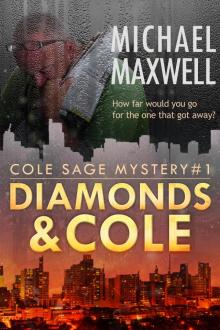 Diamonds and Cole: Cole Sage Mystery #1
Diamonds and Cole: Cole Sage Mystery #1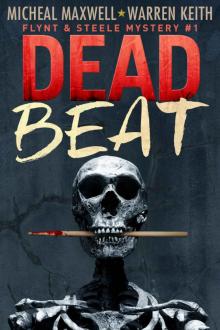 Dead Beat
Dead Beat![[Cole Sage 03.0] Helix of Cole Read online](http://i1.bookreadfree.com/28/cole_sage_03_0_helix_of_cole_preview.jpg) [Cole Sage 03.0] Helix of Cole
[Cole Sage 03.0] Helix of Cole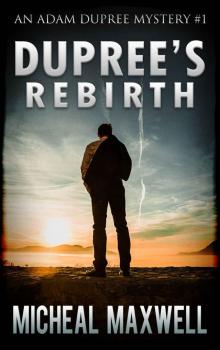 Dupree's Rebirth
Dupree's Rebirth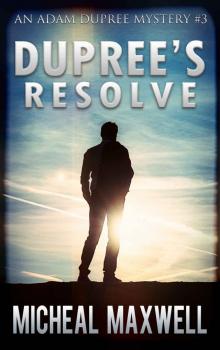 Dupree's Resolve
Dupree's Resolve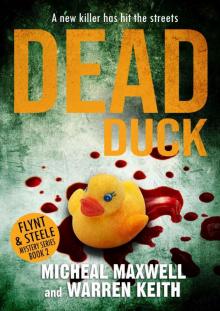 Dead Duck
Dead Duck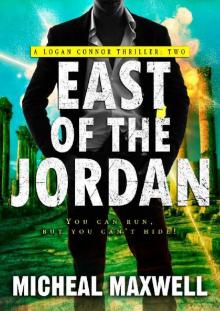 East of the Jordan (A Logan Connor Thriller Book 2)
East of the Jordan (A Logan Connor Thriller Book 2)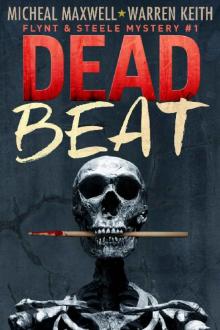 Dead Beat (Flynt and Steele Mystery Book 1)
Dead Beat (Flynt and Steele Mystery Book 1)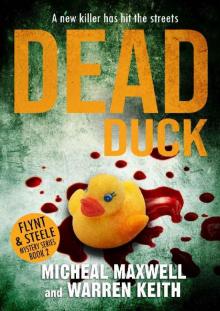 Dead Duck (Flynt & Steele Mysteries Book 2)
Dead Duck (Flynt & Steele Mysteries Book 2)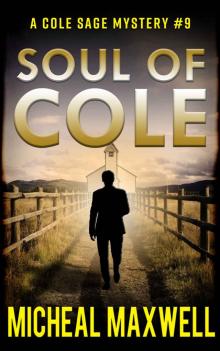 Soul of Cole
Soul of Cole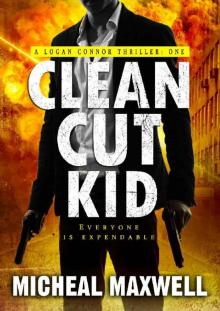 Clean Cut Kid (A Logan Connor Thriller Book 1)
Clean Cut Kid (A Logan Connor Thriller Book 1)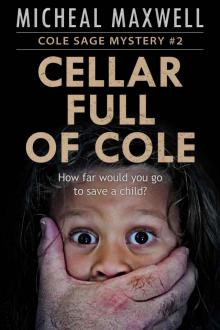 Cellar Full of Cole: A Cole Sage Mystery #2
Cellar Full of Cole: A Cole Sage Mystery #2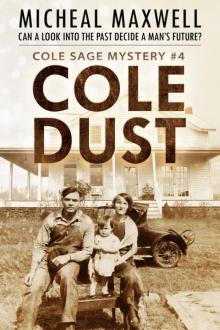 Cole Dust Cole
Cole Dust Cole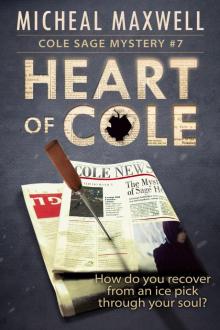 Heart of Cole
Heart of Cole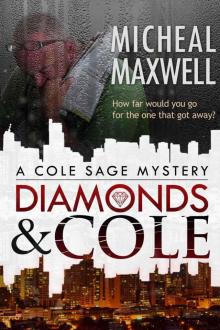 Diamonds and Cole: A Cole Sage Mystery
Diamonds and Cole: A Cole Sage Mystery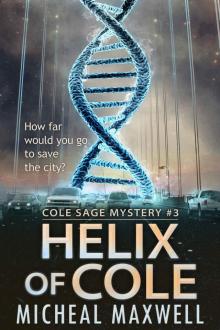 Helix of Cole
Helix of Cole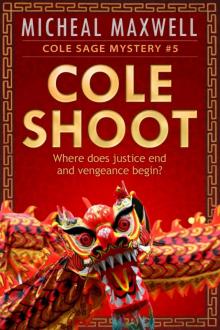 Cole Shoot
Cole Shoot